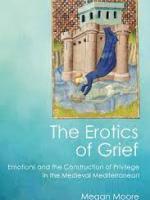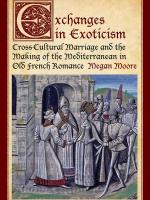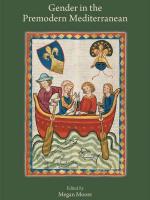
Ph.D. and M.A., French Studies, University of Michigan
Ph.D. certificate in Women's Studies, University of Michigan
B.A., University of Wisconsin
Medieval Studies; Feminism & Gender Studies; History of Emotions; Mediterranean Studies; Ecofeminism; Cyborg & Network Theory
Megan Moore is a medievalist whose work focuses on gender, identity, and cross-cultural exchange in the medieval Mediterranean, with a particular focus on literatures and cultural objects attesting to the negotiations and encounters within the Old French-speaking Mediterranean diaspora of the 12th and 13th centuries. Professor Moore's main teaching and research interests revolve around comparative questions of identity and power and mobilize sites as diverse as medieval romance, cyborg film, and post- and trans*- humanist ecofeminist critique.
Prof. Moore’s current project, Strange Figures: Disability, Epistemology, and Ecologies of Resistance in Medieval Romance, uses feminist ecocriticism, disability studies, trans* studies, and critical conversations about space, including non-representational geography, to explore a potential remapping of medieval courtliness in which non-dominant subjects' and their bodies' performance of space is integral to medieval ways of knowing, and to the idea of the court itself. By imagining nondominant spaces--say, the forest, with its hideous, outcast creatures--as integral to the geographies of medieval knowledge, this new project seeks to redefine the spatial ecologies of medieval romance. Her most recent , The Erotics of Grief: Death, Desire, and Power in Medieval Culture (Cornell University Press, 2021), received an honorable mention for the 2022 MLA Jeanne and Aldo Scaglione French and Francophone Studies Prize and was featured in a recent H-France forum. The Erotics of Grief explores how grief and power are entwined in the construction of medieval Mediterranean communities of privilege. This book seeks to understand why some grief matters more than others, why some emotional regimes can be heard and thematized, while others are erased and silenced. Her first book, Exchanges in Exoticism: Cross-Cultural Marriage and the Making of the Mediterranean in Old French Romance (U of Toronto Press, 2014) explores how women’s work on the edges of empire facilitated and economic and ideological exchange throughout the medieval Mediterranean, and focuses specifically on cross-cultural marriages between Byzantium and western Europe. Prof. Moore has also published an edited volume, Gender in the Premodern Mediterranean (Arizona State University, 2019), as well as on emotions in Byzantine literature and on feminist pedagogy, and she has a chapter on medieval affect in the second edition of The Cambridge Companion to Medieval Romance.
She also has the privilege of working together on two grant-funded projects. The first, through MU's Tri-Continental Partnership, and under the aegis of a European Research Council funded center, focuses on the place of fiction in narratives from Heliodorus to the medieval, with Dr. Claire Jackson in Prof. Koen de Temmerman's Novel Saints Project. The second, through MU's close collaborations with the University of Western Cape, is devoted to an edited volume that proposes a worlding of love with her co-PI and co-editor, Dr. Fatima Moolla. The volume, The Routledge History of Love and World Literature, is under contract with Routledge and will go into press in December 2025.
In her teaching, Prof. Moore challenges students to develop the critical visual, thinking, and writing skills crucial to unpacking the ways power is constructed around us. She teaches undergraduate and graduate courses in Gender Studies and Film Studies, such as French Feminisms in the Age of #metoo; Francophone Afro-feminisms; Invading Others: Zombies and Epidemics in film; the Mediterranean & Migration; Feeling Human: Cyborgs & Emotional Exceptionalism in the Posthuman; Medieval Mediterranean literature. She has recently directed a Mediterranean studies dissertation exploring how French-Arabic translation and cross-cultural exchange impacted late 19th- and early 20th-century education in Cairo, and she welcomes students interested in Mediterranean and Postcolonial studies, medieval gender studies, cyborgs and posthumanism, and feminist and trans* ecocriticism.

The Erotics of Grief: Emotions and the Construction of Privilege in the Medieval Mediterranean. Ithaca: Cornell University Press, 2021.
Honorable mention, Modern Language Association’s Aldo and Jeanne Scaglione Prize for French and Francophone Studies (2023).
Reviewed in Digital Philology 11.2 (2022): 351-54; Arthuriana 32.2 (2023): 5-6; French Studies 78.1 (2024): 140.
H-France forum special issue, edited by Andreea Marculescu, dedicated to discussing the book. Reviews by Tracy Adams, University of Auckland; Nuria Silleras-Fernandez, University of Colorado-Boulder; Joseph P. Derosier, Beloit College; Glenn D. Burger, Queens College and the Graduate Center, City University of New York.

Reviewed in: Speculum 90.4 (2015):1152-53; Modern Language Review 110.2 (2015): 540-541; French Studies 69.3 (2015): 376; Medium Aevum 84.2 (2015): 347-48; Medieval Feminist Forum 50.1 (2014): 166-68; The Medieval Review 14.10.17; University of Toronto Quarterly 85.3 (2016): 531-32l; Medioevo Greco 16 (2016): 372-76.
Articles & Book Chapters
“Gender in the Premodern Mediterranean” in Gender in the Premodern Mediterranean, edited by Megan Moore. Tempe: Arizona State University Press, 2019. 1-24.
“The Affective Community of Romance: Love, Privilege, and the Erotics of Death in the Mediterranean” in Reading the Late Byzantine Romances, edited by Ingela Nilsson and Adam Goldwyn. Cambridge: Cambridge University Press, 2018. 299-320.
“Romancing Death: The Erotics of Grief in the Old French Philomena,” Literature Compass 13.6 (2016): 400-411.
“Using Feminist Pedagogy to Explore Connectivity in the Medieval Mediterranean,” in Teaching Cross-Cultural Encounters, edited by Lynn Shutters and Karina Akbar. New York: Palgrave, 2014. 37-52.
“Hellenism, Islam, and Exoticism in French Medieval Romance,” Journal of Modern Hellenism 28 (2011): 47-74.
“Chrétien’s Romances of Grief: Widows and their Erotic Bodies in Yvain,” in Masculinities and Femininities in the Middle Ages, ed. Fred Kiefer. Turnhout: Brepols, 2010. 101-16.
“The Twenty-First Century Research Center for Sixteenth Century Studies,” The Sixteenth Century Journal XI.1 (2009): 198.
“Boundaries and Byzantines in the Old French Floire et Blancheflor,” Dalhousie French Studies 79 (Summer 2007): 3-20.
